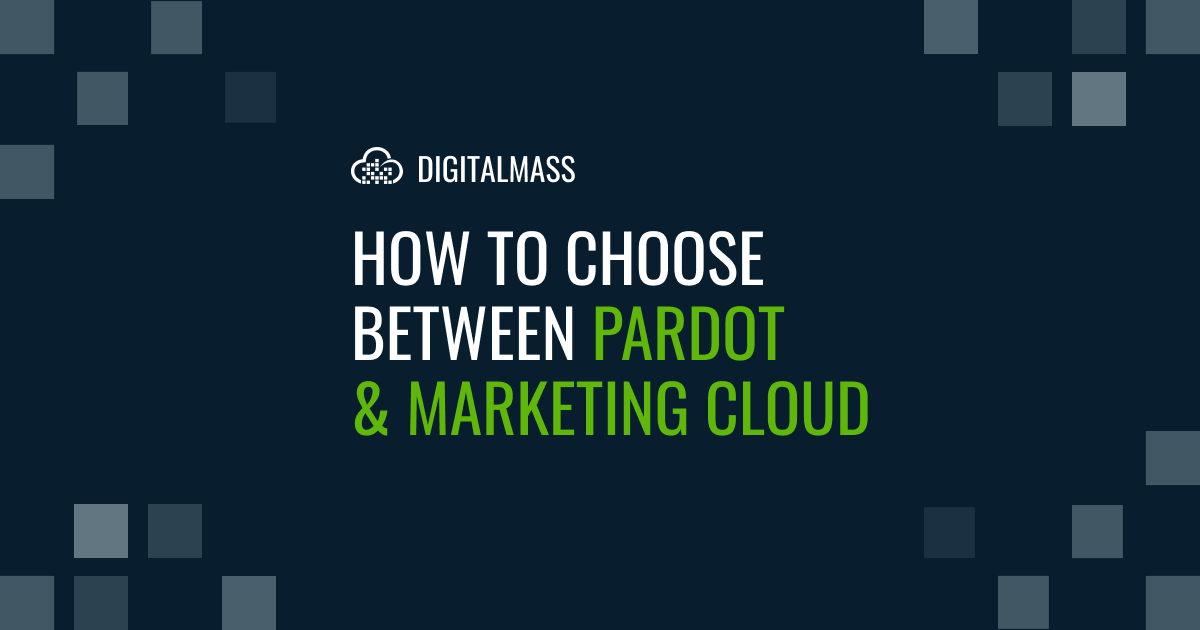Pardot and Salesforce Marketing Cloud: Which tool is right for your team?
Alex Colburn – June 15, 2021

With so many marketing automation tools on the market, it can be hard to differentiate which will be right for your team, especially when it comes to Pardot and Salesforce Marketing Cloud. There are key considerations to keep in mind before deciding between the two, and they can make or break your marketing strategy.
Pardot and Salesforce Marketing Cloud are both owned by Salesforce and are popular tools when it comes to marketing automation. Both marketing automation tools allow you to send emails, create long-term automated campaigns, categorize and group different groups of consumers, track visitors, and send information to Salesforce for reporting. Both of these tools can come out of the box and do similar things, but the path to get there looks different.
Main differences between Pardot and Salesforce Marketing Cloud
To begin, Pardot (now also known as Marketing Cloud Account Engagement) thrives in the B2B marketing automation environment with great features for email and social media marketing. The platform trades a smaller feature set for a more focused offering that requires less configuration and makes it easier to master up-front. This means that smaller teams that don't have access to technical resources will be able to start deploying campaigns and automating emails right away.
If you want to create a customized experience beyond the basics with Pardot, there are ways to extend its capabilities with additional development, but it’s not needed to get started. One caveat to keep in mind is that Pardot is typically used alongside another tool like Sales Cloud to serve as the contact management and productivity tracking piece.
On the other end, Salesforce Marketing Cloud is a platform that can stand on its own and thrives in the B2C marketing automation space.
Salesforce Marketing Cloud offers a robust feature set across multiple digital marketing studios. Salesforce Marketing Cloud is best suited for marketing teams looking for email marketing, social media marketing, mobile marketing, and online advertising.
The robust feature set that Salesforce Marketing Cloud offers means that you’ll need more planning, strategy, and configuration up-front to get things moving. To do that, you’ll need a more technical staff that understands and can use AMPscript, SQL, and SSJs to get the most out of this marketing automation platform.
How to decide between Pardot and Salesforce Marketing Cloud
At the end of the day, nobody knows your marketing team like you do. You know the size of your team, their technical capabilities, your customers, and what the marketing budget looks like.
Overall, Pardot requires a lower buy-in and is best suited for mid to large sized B2B organizations looking for a marketing automation tool that is enterprise level, but still easy to implement. Although Pardot doesn’t have much CRM capability it can be easily used alongside Sales Cloud.
Salesforce Marketing Cloud is better suited for B2C organizations that are looking for highly personalized, multi-channel customer journeys. It’s also a great choice for B2B companies that want to go to market with a B2C style customer experience. The platform does have a steeper learning curve, buy-in, and will require technical resources, but it does have more CRM capability than Pardot has, so it can stand alone and work great for businesses with a large database. With that being said, although Salesforce Marketing Cloud can stand alone, many companies still opt to use Sales Cloud or Service Cloud to assist with contact management and reporting.
Hopefully this helps give you a better idea of which marketing automation tool is right for your team. If you’re still trying to decide between Pardot and Salesforce Marketing Cloud, get in contact with our team at Digital Mass. We’ll help you put together a plan so that you can crawl, walk, and then run with your new marketing automation tool.